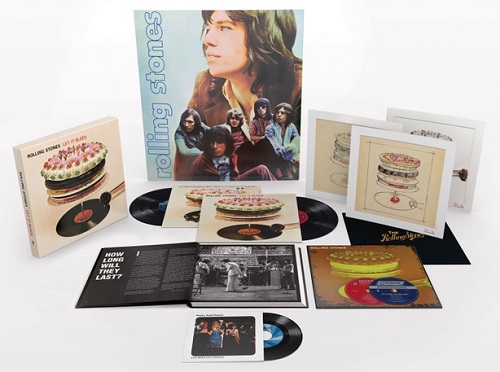While 1969 would become the Beatles’ swansong, it was a pivotal year for the Rolling Stones as well. Brian Jones, the brilliant multi-instrumentalist who’d formed the band and added so much musicality and style to their blues-based repertoire, was losing his touch thanks to a nasty habit of over indulgence and self-medication. He wouldn’t live to see the next decade. Midway through the making of Let It Bleed, Jones was replaced by Mick Taylor, a young guitar prodigy with a melodic flair. Two days after Jones died on July 3, Taylor officially became a Rolling Stone when the group played a free show at Hyde Park. It would be another five months until Let It Bleed came out. The only Stones album to feature contributions from both Jones and Taylor, it was to be the group’s final album for Decca Records in the UK and London Records in the U.S. before they established a label of their own.
Fifty years later, Let It Bleed remains one of the Stones’ most essential albums. To celebrate, ABKCO Records has boxed Let It Bleed up with two vinyl LPs, two hybrid SACDs (remastered in both stereo and mono by engineer Bob Ludwig), a reproduction of the 1969 mono single of “Honky Tonk Women” and ”You Can’t Always Get What You Want,” three hand-numbered replica-signed lithographs, a full-color restored poster from the original 1969 Decca Records package, and an 80-page hardcover book that includes an essay by journalist David Fricke and previously unpublished photos by Ethan Russell. The remastered stereo version of the album can be had as a stand-alone CD, vinyl LP, and digital download.
Following in the tracks of its 1968 predecessor, Beggar’s Banquet, Let It Bleed is filled with grit, grime, gospel, and goodness. “Gimme Shelter” and “Midnight Ramble” dabble with the dark and heavy side as easily as “Country Honk” playfully embraces a slice of country music with Taylor on slide guitar. However which way Keith Richards ended up singing the lead vocal on “You Got The Silver” (the set’s book features a quote from engineer Glyn Johns saying he erased Mick Jagger’s vocal track, even though bootleg versions with the singer exist are all YouTube), it would be the first of many the guitarist would sing. It’s also the final Stones song to include Jones, who’s barely audible on autoharp.
Shifty rockers like “Live With Me” and “Monkey Man” find Jagger spouting out some of his most poetic lyrics within the tight parameters of the arrangements. On the softer side, Robert Johnson’s “Love In Vain” floats over an acoustic mesh of guitars and Ry Cooder’s teetering mandolin. “You Can’t Always Get What You Want” employs the London Bach Choir for impact and drama. The song was apparently something Charlie Watts struggled to play, so producer Jimmy Miller took over on drums to bring the record to a close. Let It Bleed began the Mick Taylor era, a time many speculate to be the Stones’ most creative and dynamic period. Followed by Sticky Fingers and Exile On Main Street, it’s not hard to detect a pattern before Taylor quit and the Rolling Stones morphed into a stadium-filling cash cow flying high on their laurels. Even they can’t deny their best records were cut when they were hungry and wild, eager to replace the Beatles as the world’s greatest rock and roll band.




















